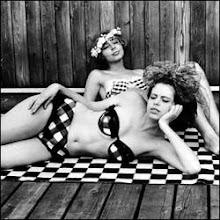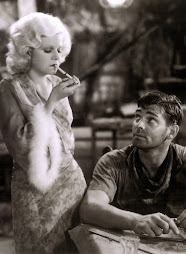I have a feeling this is going to come spilling out of me in a gush of words like the way I always ramble on when I meet a new person at a social event and they're all like, "Pleasure to make your acquaintance," and instead of just saying, "Why the pleasure's all mine," I'm all like, "My grandmother's dog ate my favorite stuffed animal bunny named Bun-Bun and then ended up choking on the plastic eyeballs and had to be rushed to the pet hospital where Grammie ended up spending the whole evening cradling her poor pup Mojo on the cold, sterile, metallic examining table while the doctors performed emergency doggie Heimlich on the poor thing to save his life. And did I mention this happened on Christmas Eve?" So, yeah.
And if that style of dialogue sounds familiar, then I hereby name you friend. If it doesn't, then I hate you.
Oh well. If I am destined for word vomit, then I heartily accept my destiny. You guessed it: Pushing Daisies. Dead as Ned's mum, thanks to the suits at ABC and the American people's lack of appreciation for the beautiful.
First of all, why can't people be more like me? Why can't they snuggle up to a warm hot cup of comfort TV in a bright yellow screwball comedy Thin Man package? Is that too much to ask?
I get it. I get why it failed. It's weird. It's "quirky" (if I never hear that word again in connection with this show, I will be forever grateful).
[I hate quirky when applied to Pushing Daisies because it immediately reduces the show to a status of "we don't know how to describe this show so as to make you actually want to watch it, so we're just going to throw it into the catch-all category of "quirky" because we're too lazy to do our jobs as critics and journalists and actually confront something that is both refreshingly different and yet strangely familiar -- (it's the mash-up of genres and the throwback to the 1930s quality of the dialogue I'm talkin' about here) and attempt to discuss what the show is about and what it says, possibly, about our culture. I can't tell you how many articles I read about Mad Men when it was in its first season that analyzed the show like crazy, about how it glamorized bad behavior even as it seemed to be criticizing it, how it played into our desires to embrace our un-PC vices, how it was all-style-and-no-substance, or all-character-and-no-plot, or the-next-great-piece-of-American-television-the-heir-to-the-mantle-of-The-Sopranos. As a fan of Mad Men, I loved it. What did we get with Pushing Daisies? "Oh, it's so quirky! And whimsical! Wow, pretty colors! You should watch! (But it's probably too weird for you. Did I mention it's quirky?)" And then that's it. No exploration of the themes, or the rich cinematic heritage the show borrowed from, or what it says about our culture that a show with a certain counter-cultural (counter to the culture of the 1960s that we are still living with, I mean) approach to romance and the romantic comedy (basically, I mean the no-touching or sexual gratification between the male and female leads) actually made it onto the air and found favor with critics. Some might challenge me by saying that the show doesn't invite a critical appraisal because the show was light fluff, a cotton candy truffle that tasted good while eating but either left one in sugar overload afterward or else was immediately forgotten upon finishing. Some might challenge with that argument, but then some might be absolute dunderheads who think the only things in life to be taken seriously are things which take themselves far too seriously. Pushing Daisies is ripe for analysis; if approached in the right manner, it's as meaty as a plate of prime rib on Mad Men. But for some reason, all the critics saw was some damn good pie and then said, "Dessert was nice, but where's my main course?" I'm as guilty as anyone, I admit. Not that more than a handful of people glance at this blog, but I must mea culpa for not at least trying to draw attention to the significance of the show. But well, jeez o'pete, I'm doing it now!]
But what I don't get is why the show was never taken seriously by the critics. Yes, I know they championed it. Yes, I know it was nominated for awards and received tons of kudos. I know it got great reviews and made top ten lists. But when I say "taken seriously" I don't mean four star write-ups in the newspaper, I mean analysis. Would analysis have saved the show? Probably not, at the end of the day. But it would have given it a little bit more of a chance. Why, you ask? Because when critics analyze a show (I'm talking new media, here, like the interwebs and stuff), it generates buzz, and pretty soon there are write-ups in The New York Times and the New Yorker and a segment on NPR and then everybody gets involved, from the conservative journals to the CNN morning show, and pretty soon the show's not just getting nominated for emmys but it's winning 'em too. And then that gets you even more buzz.
Of course, at the end of the day, even a swarm of buzz probably wouldn't have been enough to save Pushing Daisies because it was this strange combination of being totally out of touch with the times and the culture, while at the same time having been produced in and by the very culture that rejected it (shut up! that sentence makes sense in my brain -- What I'm saying is that Pushing Daisies isn't some lost Howard Hawks movie that failed to connect with a modern audience because it was just too old and weird, it was a contemporary show, produced by contemporary people that was a throwback to an older style of storytelling, while at the same time being thoroughly post-modern, so it was something probably only our culture at this moment in time could make and yet it was rejected at this moment in time by the people of our culture).
So, even though critical analysis wouldn't have saved the show, it would've and should've been worth a try. At the very least critical analysis would have helped secure a few more episodes to close out the season and give the story a somewhat satisfying conclusion. (Did I mention that the very last episode ever made of Pushing Daisies is a freaking cliffhanger???!!!! I mean, even Arrested Development and Freaks and Geeks got to end their shows with some measure of completion.) Even more than getting us a few more episodes, though, critical analysis was worthy in and of itself for a show as fascinating and powerful as Pushing Daisies. Yeah, that's right. Powerful.
What? You don't think a screwball comedy can be powerful? Too bad for you. I can't say it's as weighty and "powerful" as The Sorrow and Pity, but Annie Hall is potent stuff. It's funny and sad and poignant and true and yeah, it's not a straight up screwball, but it owes some debt to the great witty romantic comedies of the 1930s. Same thing with When Harry Met Sally. Or, take a trip with me, how about The Philadelphia Story? My Man Godfrey is the silliest darn thing you'll ever meet, but I bet you a dime to a dollar that there's oodles of essays written and being written about that one. Same goes for It Happened One Night and His Girl Friday and The Awful Truth. These movies are powerful. Yes, their themes are different from Citizen Kane's or 2001: A Space Odyssey, but just because the theme might deal with love or romance or social mores doesn't make it less powerful. I guarantee that more people have been affected and moved by the end of Some Like It Hot than have by the end of There Will Be Blood. Maybe they're not crying there eyes out or contemplating the meaning of life, but they are delirious with the joys and comedies and paradoxes of life. And I guarantee you there's some movie critic blogger out there right now working out a rough draft for a Some Like It Hot essay.
So where are the Pushing Daisies essays? Maybe I've missed them. It's entirely possible; the Internet's a big place and even though I try to keep up on stuff like this, I can't read everything. And let me be clear again, I'm not talking about good reviews. I'm talking about analysis. Nerdy essays that agonize over what it means for there to be a romantic comedy on television in 2008 in which the boy can't touch the girl or else she'll die, literally, and what that implies about sexual relations as they've developed in the early 21st century. Essays with titles like: "Is the sexual revolution dead, Or did the Pie Maker touch chastity and bring her back to life?" Like I said, maybe there are essays out there and I missed them. Cool, whatevs. But usually the essays that are out there lead to more essays which lead to more essays which lead to cover stories in the NY Times. Again, think Mad Men.
Of course, essays don't lead to essays unless at least a few people out there are actually watching. And my gut tells me that not only weren't normal Americans watching, but most critics (even ones who praised the show) weren't really watching (or they weren't watching with a analytical eye) either. Could be that the show just wasn't very good, I guess. That I'm in the minority because I like not very good things that just happen to push my aesthetic buttons. I mean, don't I know that The Wire's the best show on TV? Stop messing about with cream pies and cartoonish art direction already. Sure Pushing Daisies is delightfully whimsical (say the stealth haters), but it's just a little "too much," dontcha think? It's clever (say the stealth haters), but it's easily forgotten fluff. I blame the fanboyish nature of nerdy criticism today.
Science fiction-y shows and/or "guys shows" like Sopranos and Entourage get a lot of play on the Internet because they appeal to guys. Girly shows like Grey's Anatomy survive and thrive on TV not because they're being written up by the dorks on their blogs but because they're mainstream chick shows about relationships and feelings, and they're familiar. Familiar shows usually succeed if they're well-written. Weird and envelope-pushing shows need the help of the nerdy analyzers and/or lots 'o buzz. The nerdy analyzers didn't feel like analyzing a sunny, funny, kooky romantic comedy/cartoonish murder mystery show so Pushing Daisies had to survive on the initial buzz of its first wave of newspaper reviews and advertising push. Unfortunately, that lasted for about 60 seconds of frenzied media culture time, and Pushing Daisies dropped dead with the touch of a million couch potatoes' fingers as they switched to something else.
So that's why I blame America. Even if the critics had analyzed the shit outta this show, it still wouldn't have made it. It's not really America's fault, of course, and I'm being kinda cold for hating on people who just want to relax and enjoy themselves after a hard day's work. I can't really relate to people who don't find Pushing Daisies relaxing and enjoyable, so I guess that solves the mystery as to why this show failed to find an audience: Not enough people are weird like me. But then I have to ask myself: Why aren't more people weird like me? I mean, a few million people are, 'cause Pushing Daisies managed to draw 4ish million viewers a week. But why not more? Why can't a show that draws on such classic (popular) fare as Dr. Seuss, The Thin Man movies, 1930s screwball comedy, Broadway musicals, Looney Toons, Charles Dickens, and Tim Burton be more popular? Why
are so many people turned off by "cutesy," and "whimsy," and "sweet," and "sentimental"? Of better yet, why are so many people only seeing the cutesy, whimsy, sweet, and sentimental instead of also seeing the black humor and innuendo and morbidity and human pain? I mean, this is a show about a woman who was brought back from the dead by her childhood sweetheart who also, by the way, killed her dad when they were little because he decided to bring his own mom back from the dead and the universe must have balance so it balanced the scales by killing someone else (the dad) and also there's unrequited love, a cynical father who hasn't seen his daughter in years, and two aunts who are in misery because the niece they raised as their daughter was murdered (and she's in misery too, because she's been brought back from the dead but she can never let her aunts know that). (There's plenty more darkness besides, but this is the general idea. Did I mention there's hilariously gruesome murders every week?) And to top it all off, the guy and the gal who are totally in love and want to spend the rest of their lives together can never touch or else the gal will die, forever. That's heartbreaking stuff. That's powerful. But gosh darn it, those characters over there are wearing silly hats, so this show must be candy-colored goof-twaddle!
Gah!
Pushing Daisies is the closest thing to a great romantic comedy (in the classic sense) that we've had since When Harry Met Sally. The question on every female film critics' mind for the past few years -- Where have all the good Rom Coms gone? -- is answered in Pushing Daisies. They're gone to television. Certainly, Pushing Daisies is not a traditional Rom Com, since it's so utterly fantastical, but despite the mash-up of Comedy, Murder Mystery, and Fantasy, the will-they-or-won't-they (with a twist!) romance between Chuck and Ned, the good-natured pining of lovable Olive Snook, the delicious snark of Emerson Cod, and the general all-around madcapness and wit of the show all add up to the wonderful elements that made classic films by Capra, Hawks, Wilder and co. so enduring.
Or do they endure? I bet if you took the average American television viewer and had her watch Bringing Up Baby or Ball of Fire, she'd say "Corny" (and black and white, ugh!) and pass. But ask the average moviegoer in 1940 to watch 'em and watch out box office returns! Are we just a bunch of mush brained thickheads today? Have we devolved in terms of what entertains and satisfies us? The snob in me says "yes," and I really do try hard to strangle that snob whenever she appears. Truly. I hate snobs because snobs look down on things like The Sound of Music and J.R.R. Tolkien. The Sound of Music is beautiful in its own corny, sentimental way. Tolkien is one of the great writers of the 20th century. Snobs can stuff it.
But when I look at the sad case of Pushing Daisies, my inner snob surfaces. Why don't people love witty, rapid-fire dialogue anymore? Why don't people delight in a romantic comedy with real sexual tension, where the lovers don't actually jump into bed five minutes after they've met each other? Why don't people want to spend time with a happy (and yet sad), sunny (and yet dark), weird (and yet filled with relatable human emotion) television show every week? Why don't more people love Pushing Daisies? WHYYYYYYYY?!!!!!!
Deep down I know the answer. For all of its mainstream cultural borrowings (from Seuss to Lubitsch to Pee Wee Herman), when you put 'em all together it equals Weirdsville and most people just can't hop on that last train. Intellectually, I get it. I get why the show failed to find an audience.
But every week I watch the latest episode (and soon it will be the last), and I just can't seem to get over the fact that Pushing Daisies is a little masterpiece of a show and hardly anybody noticed outside of the critic's desk and us 4.6 million. And it makes me sad that most TV watching people in America weren't able to notice. Like I said, it's not their fault. Our culture isn't there anymore; the place where it would need to be to appreciate a clever and complicated romantic fantasy. Maybe it was never there, even back when Capra was king and zany comedies were filled with double entendres and daffy dames. Like I said, Pushing Daisies is a throwback, but it's also so thoroughly post-modern that it couldn't have been made in any other era. It draws from the past; it's outside of time; and yet it's the product of artists in 2008. Too bad the audience of 2008 didn't understand what all the fuss was about.
And if ABC would just let Bryan Fuller and the cast shoot ONE MORE EPISODE so they could wrap up the show in a somewhat rumply bow of resolution for the story and our characters, instead of leaving us fans with the anguish of a cliffhanger, I would hit the delete button on this post faster than you can say Darling Mermaid Darlings.
 A 1927 silent feature from MGM starring Lon Chaney (in a duel roll!)
A 1927 silent feature from MGM starring Lon Chaney (in a duel roll!)














_01.jpg)






